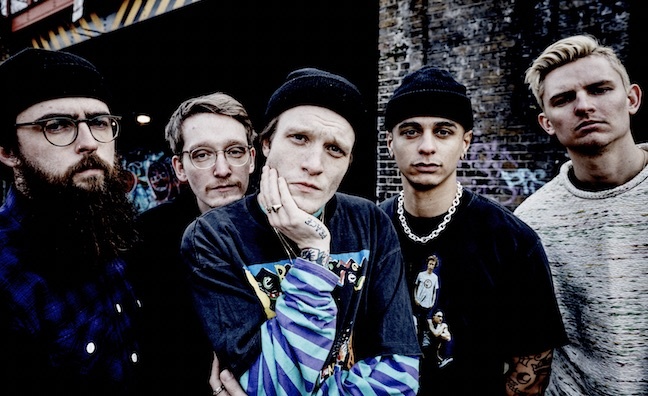As part of our special rock issue of Music Week, key executives from labels, management and DSPs have discussed the ebb and flow of heavy music on streaming platforms.
As well as crunching the latest streaming numbers from the Official Charts Company, there are key insights from Spotify and Amazon Music along with cover stars Bring Me The Horizon.
Top 5 UK rock act Neck Deep have made inroads on streaming, with 1.3 million monthly listeners on Spotify. Here, Neck Deep’s manager Leander Gloversmith of IE:Music shares his vision for the genre’s digital future…
How have Neck Deep cracked streaming and how can they go further?
“I’d say that it’s at least in part a generational thing. The band and their fanbase are digital natives; Neck Deep’s career has co-existed and developed alongside the growth and evolution of streaming platforms, and of streaming as a listener habit. So the band have benefitted from the simple fact that consuming and discovering music via DSPs is what a portion of their demographic accepts as normal. The internet, social media, smartphones, etc, are all totally standard tools for the band and their fans alike. But that said, the balance of Neck Deep’s physical unit sales and streaming presence remains very much tilted in favour of physical, so there is a lot of room for them to grow in the digital space still.
“In terms of going further, we have discussed embracing features and crossover collaborations with other artists who straddle the worlds of rock and what I suppose one might call the ‘streaming mainstream’, to introduce Neck Deep to the emerging next generation of listeners, where genre has become almost totally irrelevant.”
What do DSPs need to do to support the genre – are there encouraging signs?
“Encouraging signs for sure: Ali Hagendorf is champion for the genre at Spotify, and very much in tune with the genre’s heritage but also where it’s headed next. Spotify recently launched the Rock This podcast on the platform which Ali hosts (tied in with the biggest rock-geared editorial playlist on the platform, Rock This – 4.5m followers). On that show, Ali is highlighting that new generation of artists, who are essentially reframing rock and alternative for the next generation of listeners. Elise Cobain at Amazon Music UK is also doing amazing things for the genre, and is really invested in bringing the weight of the brand to helping rock music and culture grow, evolve and reach new people.
“In terms of doing more, I believe the passion and dedication that people such as Ali and Elise show is perfect - there’s simply just not enough of them flying the flag. Rock is a layered world and a lifestyle culture, a whole industry of its own, and it probably requires more than a single champion on staff here and there (no matter how superhuman their efforts). There is so much scope and potential in the genre, and such rich foundations to build on, but I think DSPs need to invest more resources to help it bridge the current gap more effectively, to embrace the culture of it as much as the songs. As I said, rock has always had a whole cottage industry around it, of people and outlets devoted to furthering its cause, and that probably needs to be reflected within this new age digitally-led industry as well.”
We have discussed embracing features and crossover collaborations with other artists who straddle the worlds of rock and the streaming mainstream
Leander Gloversmith
And what do bands/labels need to look at to boost streaming results? Are rock covers of pop hits a good idea?
“I think the willingness to collaborate with DSPs and super-serve audiences is absolutely there. There are just not enough toolkits available to the labels and bands of the genre as of yet, and not enough conversations are happening about how to best help rock and alternative culture translate and transpose into these digital spaces. As I said, there are some awesome lone wolves on staff at DSPs, but single people can only do so much. And it’s likely a cycle: why would you double down on a genre that looks like it’s underperforming? So many of the successes in this space occur in the ‘real’ world, at massive shows and festivals and in merchandise sales etc, and these things just aren’t being communicated or quantified in the streaming data. I think everyone who really watches and gets this world totally understands that phenomenon, but there’s a bit of a glitch in the communication chain, as it were.
“In terms of covers, I think that’s totally subjective. Personally I believe that they’re for the most part counterproductive in the long run. It’s a culture that thrives, ultimately, on integrity over novelty.”
Finally, what about the fans - do they need 'educating' on streaming?
“It’s not a matter of education per se. Streaming needs to become more integrated for the fans, and vice versa, and I do think that will require more than the music simply being available to listen to on the platforms. As I keep saying, rock is a ‘tribal’ culture, perhaps more akin to sports fandom than to other genres of music, and thusly rock fans and artists need to feel as though DSPs are places to which they can and do ‘belong’, not just tech platforms on which their music is consumed as product.”
The rock issue is out now – subscribers can click here for our exclusive report on rock and streaming.
* To make sure you can access Music Week wherever you are, subscribe to our digital issue by clicking here.









